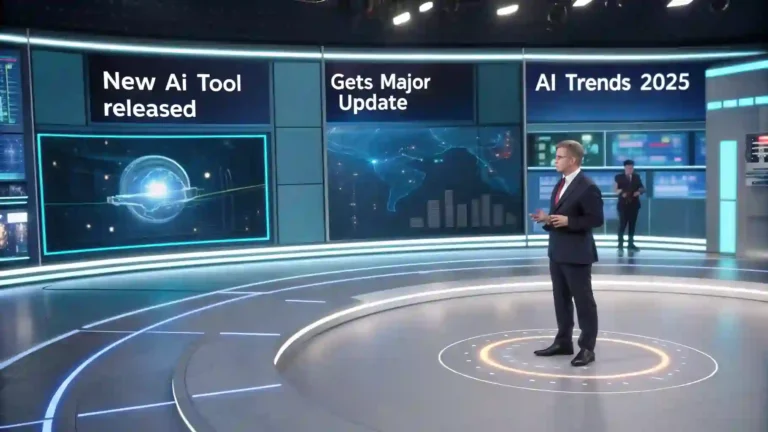What’s New in AI This Month? [May 2025 Updates]
Meta Title: AI News & Updates – May 2025
Meta Description: Stay informed with the latest AI developments from May 2025, including new tools, model advancements, and industry shifts.
🔍 Introduction: The AI Landscape in May 2025
May 2025 has been a pivotal month in the AI industry, marked by groundbreaking advancements, strategic partnerships, and significant product launches. From enhanced AI models to new tools and global initiatives, here’s a curated roundup of the most impactful AI news this month.
🧠 Major AI Model Updates
Google’s Gemini 2.5 Pro & Flash
Google introduced the Gemini 2.5 Pro and Flash models, enhancing reasoning capabilities and introducing a new “Deep Think” mode for complex tasks. These models support native audio output and improved security features. General availability is expected in June 2025. MarketingProfs+4Wikipedia+4Wikipedia+4
Anthropic’s Claude 4
Anthropic released Claude 4, comprising Claude Opus 4 and Claude Sonnet 4. These models offer extended operational durations, with some capable of functioning autonomously for up to seven hours, marking a significant leap in AI autonomy. Wikipedia
DeepSeek’s Enhanced R1 Model
Chinese AI startup DeepSeek unveiled an upgraded version of its R1 model, named DeepSeek-R1-0528. The enhanced model features improvements in mathematics, programming, and general logical reasoning, and claims to significantly reduce AI-generated misinformation or “hallucinations.” The Times of India
🛠️ New AI Tools & Platforms
Google’s Veo 3
At the Google I/O 2025 event, Google unveiled Veo 3, its most advanced AI-powered video generation tool. Veo 3 can produce highly realistic videos from simple text prompts, including synchronized audio, dialogue, ambient sounds, music, and background noise, making it a transformative tool for content creators and educators. Wikipedia+3The Times of India+3TechRadar+3
Google’s AI Mode Expansion
Google expanded its AI Mode to all U.S. users, enabling more natural, conversational queries via Gemini 2.5. This shift is part of a broader transformation in how users interact with search, moving towards more interactive and personalized experiences. The Times of India+3MarketingProfs+3Wikipedia+3
OpenAI’s ‘Operator’ AI Assistant
OpenAI launched “Operator,” a new AI assistant capable of handling various online tasks, such as ordering groceries and processing ticket purchases. Initially available to ChatGPT Pro users, the Operator functions as a semi-autonomous agent, requiring user input for specific actions like account logins. Crescendo
🌍 Industry & Policy Developments
Meta’s AI Team Restructure
Meta is restructuring its artificial intelligence teams to accelerate the development and deployment of new AI products and features amid increasing competition from companies like OpenAI, Google, and ByteDance. The restructuring aims to increase ownership within each organization while clearly defining team dependencies. Axios
Odisha’s AI Policy-2025
On May 28, 2025, the Odisha state cabinet approved the Artificial Intelligence (AI) Policy-2025, making the state a pioneer in AI-driven governance and innovation in India. The policy aims to promote responsible AI adoption across sectors such as healthcare, agriculture, education, disaster management, and governance. The Times of India
Humain’s Launch in Saudi Arabia
Saudi Arabia launched Humain, a new AI company under the Public Investment Fund, to develop artificial intelligence infrastructure and services. The company aims to position Saudi Arabia as a global leader in AI innovation and infrastructure. Wikipedia
🧬 AI in Healthcare & Science
DeepSeek in China’s Healthcare
DeepSeek has emerged as a leading AI system in China’s tertiary hospitals, enhancing diagnostic accuracy, streamlining workflows, and improving patient management. The AI-powered systems have demonstrated significant potential in optimizing medical processes and reducing the cognitive burden on healthcare professionals. arXiv+1The Times of India+1
‘Doudna’ Supercomputer for AI Research
A new supercomputer named “Doudna,” after Nobel Prize-winning biochemist Jennifer Doudna, will be launched at the Lawrence Berkeley National Laboratory to advance artificial intelligence and scientific research, particularly in genomics. The supercomputer is scheduled to go online next year and will be developed in collaboration with Dell Technologies and Nvidia. AP News


